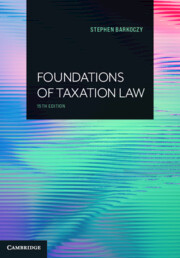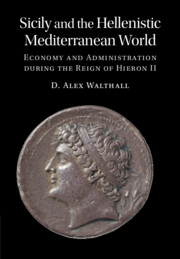303 results
Inequalities in wealth distribution within Imperial Assyrian graves
-
- Journal:
- Antiquity , First View
- Published online by Cambridge University Press:
- 03 June 2024, pp. 1-16
-
- Article
-
- You have access
- Open access
- HTML
- Export citation
Public Preferences Over Changes to the Composition of Government Tax Revenue
-
- Journal:
- British Journal of Political Science , First View
- Published online by Cambridge University Press:
- 17 May 2024, pp. 1-11
-
- Article
-
- You have access
- Open access
- HTML
- Export citation
The fiscal transformation of the Spanish Carrera de Indias in the 17th century: a reinterpretation
-
- Journal:
- Revista de Historia Economica - Journal of Iberian and Latin American Economic History , First View
- Published online by Cambridge University Press:
- 15 April 2024, pp. 1-22
-
- Article
-
- You have access
- Open access
- HTML
- Export citation
The equitable impact of sugary drink taxation structures on sugary drink consumption among Canadians: a modelling study using the 2015 Canadian Community Health Survey-Nutrition
-
- Journal:
- Public Health Nutrition / Volume 27 / Issue 1 / 2024
- Published online by Cambridge University Press:
- 15 April 2024, e121
-
- Article
-
- You have access
- Open access
- HTML
- Export citation
Of Rule not Revenue: South Sudan’s Revenue Complex from Colonial, Rebel, to Independent Rule, 1899 to 2023
-
- Journal:
- Comparative Studies in Society and History , First View
- Published online by Cambridge University Press:
- 01 April 2024, pp. 1-27
-
- Article
-
- You have access
- Open access
- HTML
- Export citation
Isolationism, instrumentalism and fiscal policy
-
- Journal:
- Economics & Philosophy , First View
- Published online by Cambridge University Press:
- 27 March 2024, pp. 1-19
-
- Article
-
- You have access
- Open access
- HTML
- Export citation
4 - Social Justice through Taxation?
-
-
- Book:
- Social Justice in Twentieth-Century Europe
- Published online:
- 29 February 2024
- Print publication:
- 07 March 2024, pp 78-95
-
- Chapter
- Export citation
5 - Money, Credit and Banking, 1000–1500
- from Section II - The Medieval Economy, 1000–1500
-
-
- Book:
- An Economic History of the Iberian Peninsula, 700–2000
- Published online:
- 22 February 2024
- Print publication:
- 29 February 2024, pp 130-157
-
- Chapter
- Export citation
1 - Muslim and Christian Polities, 700–1200
- from Section I - The Early Middle Ages, 700–1200
-
-
- Book:
- An Economic History of the Iberian Peninsula, 700–2000
- Published online:
- 22 February 2024
- Print publication:
- 29 February 2024, pp 25-46
-
- Chapter
- Export citation
4 - The Polity, 1000–1500
- from Section II - The Medieval Economy, 1000–1500
-
-
- Book:
- An Economic History of the Iberian Peninsula, 700–2000
- Published online:
- 22 February 2024
- Print publication:
- 29 February 2024, pp 102-129
-
- Chapter
- Export citation
Three - Cities in the Kingdom
- from Part I - Fashioning a Kingdom
-
- Book:
- Sicily and the Hellenistic Mediterranean World
- Published online:
- 27 January 2024
- Print publication:
- 22 February 2024, pp 82-110
-
- Chapter
- Export citation
Introduction
-
- Book:
- Sicily and the Hellenistic Mediterranean World
- Published online:
- 27 January 2024
- Print publication:
- 22 February 2024, pp 1-14
-
- Chapter
- Export citation
Conclusion
-
- Book:
- Sicily and the Hellenistic Mediterranean World
- Published online:
- 27 January 2024
- Print publication:
- 22 February 2024, pp 338-346
-
- Chapter
- Export citation
Eight - Institutions and Markets in Hieronian Sicily
- from Part II - Measuring a Kingdom
-
- Book:
- Sicily and the Hellenistic Mediterranean World
- Published online:
- 27 January 2024
- Print publication:
- 22 February 2024, pp 296-337
-
- Chapter
- Export citation
Four - Seeing the Hieronian State
- from Part II - Measuring a Kingdom
-
- Book:
- Sicily and the Hellenistic Mediterranean World
- Published online:
- 27 January 2024
- Print publication:
- 22 February 2024, pp 113-156
-
- Chapter
- Export citation
Individualism, universalism and climate change
-
- Journal:
- Journal of Institutional Economics / Volume 20 / 2024
- Published online by Cambridge University Press:
- 20 February 2024, e17
-
- Article
-
- You have access
- Open access
- HTML
- Export citation
Giving fruits and vegetables a tax break: lessons from a Dutch attempt
-
- Journal:
- Public Health Nutrition / Volume 27 / Issue 1 / 2024
- Published online by Cambridge University Press:
- 15 February 2024, e70
-
- Article
-
- You have access
- Open access
- HTML
- Export citation

Foundations of Taxation Law
-
- Published online:
- 09 February 2024
- Print publication:
- 15 February 2024
-
- Textbook
- Export citation
Shariʿa and Governance in Ottoman Egypt: The Waqf Controversy in the Mid-Sixteenth Century
-
- Journal:
- International Journal of Middle East Studies / Volume 56 / Issue 1 / February 2024
- Published online by Cambridge University Press:
- 14 March 2024, pp. 55-74
- Print publication:
- February 2024
-
- Article
-
- You have access
- Open access
- HTML
- Export citation

Sicily and the Hellenistic Mediterranean World
- Economy and Administration during the Reign of Hieron II
-
- Published online:
- 27 January 2024
- Print publication:
- 22 February 2024



